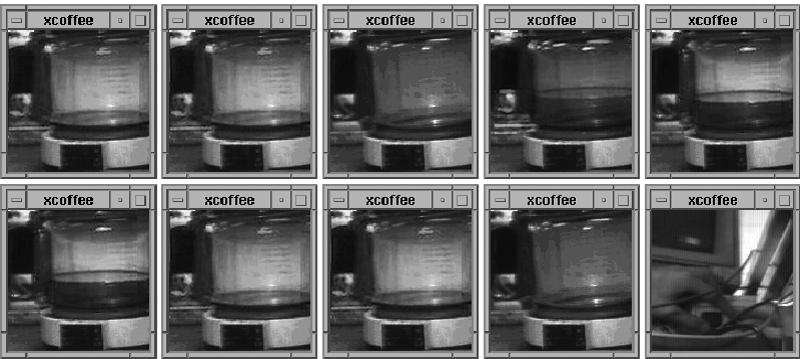
The Telethon, Trojan Room Coffee Pot, YouTube and Twitch
The Telethon Set the stage for what would become an integral fixture in entertainment technology. Live non-charity events were of course more typical, but I wanted to discuss telethons specifically because I will be going in-depth on charity livestreams. These were live television events that raised funds for charities through viewer participation, combining scripted entertainment with real-time audience engagement. This format laid the groundwork for digital livestreaming models by encouraging community involvement and immediate satisfaction, that hit of persona was fresh and unique.
The Trojan Room Coffee Pot was the first webcam. Developed in 1991 at the University of Cambridge, it was used to check the fullness of a coffee pot in a break room known as the Trojan Room. It never streamed footage like we think of now-- with high frame rates-- but it was rather the rotating images of the coffee pot so researchers could check if it was full without leaving their desks. Though simple, it's a vital moment in internet history. The rise of streaming was in part due to this successful experiment.
 |
| The Trojan Room Coffee Pot of lore. |
YouTube, launched in 2005, essentially created the streaming of video content that we have now. It revolutionized content creation. Rather, the phrase 'content creation' was popularized by creators on the platform. By enabling anyone with a camera and internet connection to share videos with a global audience, YouTube democratized the landscape. Now it fosters the influencer economy and niche communities. Its intuitive, shifting algorithms and monetization systems fundamentally reshaped entertainment.
Then Twitch, around a decade later in 2011 extended this democratization into live-focused content. Though its largest reach is through gaming, it pulls communities from all professions and hobbies. Twitch set a new standard for digital community-building with the establishment of the culture of close chat interaction. YouTube and Twitch transformed how content is created, shared, and received.
Digital Currency
No, not bitcoin or crypto or whatever alternative money trend will be popular in the next five years.
Set up in your mind the exchange of two equivalent values: entertainment for currency. Currency being time, money, thoughts, etc. Everything that you do online turns into currency that is bought with entertainment.
Digital spaces where the line blurs between off and online foster a strong sense of community and belonging. Audiences beg for that reality and life, the closeness of a person as if they were next to them.
What I mentioned before, about persona? That is what content aims to sell now.
Rather than selling a show or information, streaming content is largely persona-based. Selling yourself. No example is without exception. There is always an alternative-- niche communities exist solely for those who seek it out. But the problem is that these large communities dominate the market so heavily. And it's entirely for profit. Entertainment for profit isn't abnormal, but what's considered 'entertainment' is what I take issue with. People, on both sides (creator and audience), spend hours every day absorbed online.
They sit and exist only in the recesses of online life, without consciousness to recognize they even spend that much time on videos or lives. This graph elucidates my point clearly.

It's an incredibly unhealthy thing, to shut the world out. Those who are content creators try to eat up and maximize your time as much as they can. Not in a malicious way, but the algorithms that give them their reach promote this cannibalistic lifestyle.
I often put video essays, educational lives, or gameplay in the background of my study sessions. When I don't have friends to work with, the video acts as another presence. I watch videos about my interests for fun. But I am very conscious of how much time I spend online, and I never let myself get dragged into the reality of streaming.
For a year or so when I entered highschool, I was having some trouble interacting with the real world due to my physical condition and medical problems. So instead of facing it, I sunk into the surreal internet. It took over all of my free time, and I grew reliant on it. I'm so concerned about the psychology and effects of streaming because it took a portion of my life that I will never get back. It's casual fun, but when you have nothing else, it may assimilate the self into the mess of persona that exists only online.
Content Creators Becoming Philanthropists
Though we're mostly discussing the ramifications of streaming, and that happens to sound (and be) negative, there is great social contributions that come from streaming.
Community-building within the social media and digital content creation fields has led to great positives for the audience's mental state. At healthy levels of interaction, one can actively be engaged with likeminded people and feel a sense of fulfillment in how they interact with the creator and their content. This principle of bonding between the screen is particularly relevant in the modern digital age, where social media platforms are tailored for the exchange of currency. This time, it happens to be actual dollars.
Streams with donations are the basis and a key part of a creator's revenue, but they can give it back. Charity streams are a type of live that is exactly how it sounds-- the audience gives money to the content creator, and they deliver those donations to charity funds.
These events highlight the reciprocal relationship between creator and audience, where expression, support, and shared purpose combine in a melting pot for a truly good cause. Within this framework, it supports not only the creator’s reputation but also the collective population.
Content Currency
 |
| A LAN party is a gathering with the intent to play video games together. It shows the ripe potential for community. |
As negative as I was for the Digital Currency section, I truly believe that there is no measure for good or bad in the age of the internet. The colonization of headspace that companies, advertisers, the government and content creators engage in is unhealthy. They vy for our attention. That is at direct odds with the money that is raised in purity and for relief.
Currency flows richly through technology, and it is up to the singular person to decide what they will balance their life with. Everyone is trying to take your attention, which means it's important. The choice to take a break, to watch, to support isn't a flimsy choice, a menial one like cereal or an apple for breakfast. Be intelligent and thoughtful when interacting online, because every choice matters. The part of the human consciousness that lives online is degraded by video constantly played in the background, but enriched by deliberate quiet. Choose to engage, but be aware of yourself.
Sources
Livestreams are the new telethons, and they’re raising millions for charities
No comments:
Post a Comment